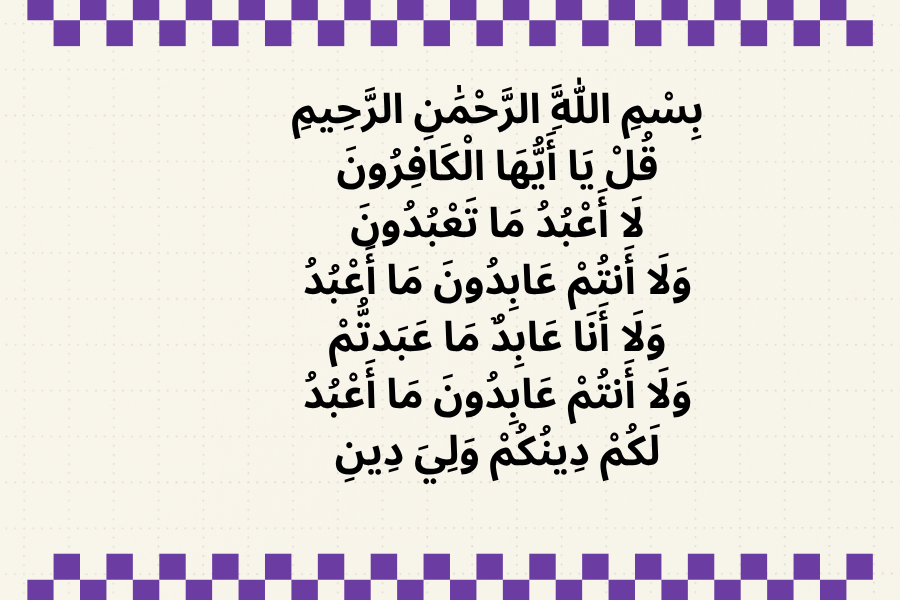The Qur’an is a complete guidance for humanity, a light that heals, protects, and purifies the soul. Among its many chapters, there are four short yet immensely powerful surahs that hold a special place in every Muslim’s heart. Known collectively as the Four Qul or 4 Qul of the Quran, these are Surah Al-Kafirun, Surah Al-Ikhlas, Surah Al-Falaq, and Surah An-Nas. Each begins with the divine command “Qul” (قُلْ), meaning “Say”, a word through which Allah directly addresses His Messenger ﷺ and, by extension, every believer.
Despite their brevity, the four qul in Quran encompass profound truths about faith, sincerity, protection, and the oneness of Allah (Tawheed). They remind us to rely solely on our Creator in times of fear, temptation, and adversity. Reciting the 4 Quls in Islam brings immense spiritual benefits, safeguarding one’s heart from disbelief, one’s mind from doubt, and one’s soul from evil.
In this article, we will explore the importance and top benefits of the 4 Qul, along with their Arabic text, transliteration, and four qul with translation in English. Whether you seek protection, inner peace, or a stronger connection with Allah, understanding these surat 4 qul will illuminate your path and deepen your spiritual journey.
The Texts, Transliteration, and English Translation of Four Quls
Below are the surat 4 qul in Arabic, followed by transliteration and their English meaning.
The 1st QUL
Surah Al-Kafirun (Chapter 109) – “The Disbelievers”
Arabic (with Bismillah):
بِسْمِ اللَّهِ الرَّحْمَٰنِ الرَّحِيمِ
قُلْ يَا أَيُّهَا الْكَافِرُونَ
لَا أَعْبُدُ مَا تَعْبُدُونَ
وَلَا أَنتُمْ عَابِدُونَ مَا أَعْبُدُ
وَلَا أَنَا عَابِدٌ مَا عَبَدتُّمْ
وَلَا أَنتُمْ عَابِدُونَ مَا أَعْبُدُ
لَكُمْ دِينُكُمْ وَلِيَ دِينِ

Transliteration:
Bismillāhi r-Raḥmāni r-Raḥīm
Qul yā ayyuhā al-kāfirūn
Lā aʿbudu mā taʿbudūn
Wa lā antum ʿābidūna mā aʿbud
Wa lā anā ʿābidum mā ʿabadtum
Wa lā antum ʿābidūna mā aʿbud
Lakum dīnukum wa liya dīn
English Translation:
In the name of Allah, the Most Gracious, the Most Merciful.
Say, “O disbelievers,
I do not worship what you worship.
Nor are you worshippers of what I worship.
Nor will I be a worshipper of what you worship.
Nor will you be worshippers of what I worship.
For you is your religion, and for me is my religion.”
The 2nd QUL
Surah Al-Ikhlas (Chapter 112) – “The Purity / Sincerity”
Arabic (with Bismillah):
بِسْمِ اللَّهِ الرَّحْمَٰنِ الرَّحِيمِ
قُلْ هُوَ اللَّهُ أَحَدٌ
اللَّهُ الصَّمَدُ
لَمْ يَلِدْ وَلَمْ يُولَدْ
وَلَمْ يَكُن لَّهُ كُفُوًا أَحَدٌ

Transliteration:
Bismillāhi r-Raḥmāni r-Raḥīm
Qul huwa Allāhu aḥad
Allāhu ṣ-Ṣamad
Lam yalid wa lam yūlad
Wa lam yakun lahu kufuwan aḥad
English Translation:
In the name of Allah, the Most Gracious, the Most Merciful.
Say, “He is Allah, [who is] One,
Allah, the Eternal Refuge (Self-Sufficient, on whom all depend).
He neither begets nor is born,
Nor is there to Him any equivalent.”
The 3rd QUL
Surah Al-Falaq (Chapter 113) – “The Daybreak / Dawn”
Arabic (with Bismillah):
بِسْمِ اللَّهِ الرَّحْمَٰنِ الرَّحِيمِ
قُلْ أَعُوذُ بِرَبِّ الْفَلَقِ
مِن شَرِّ مَا خَلَقَ
وَمِن شَرِّ غَاسِقٍ إِذَا وَقَبَ
وَمِن شَرِّ النَّفَّاثَاتِ فِي الْعُقَدِ
وَمِن شَرِّ حَاسِدٍ إِذَا حَسَدَ

Transliteration:
Bismillāhi r-Raḥmāni r-Raḥīm
Qul aʿūdhu bi-Rabbi l-falaq
Min sharri mā khalaq
Wa min sharri ghāsiqin idhā waqab
Wa min sharri n-naffāthāti fī l-ʿuqad
Wa min sharri ḥāsidin idhā ḥasad
English Translation:
In the name of Allah, the Most Gracious, the Most Merciful.
Say, “I seek refuge in the Lord of daybreak
From the evil of what He has created,
From the evil of darkness when it settles,
From the evil of those who blow on knots,
And from the evil of an envier when he envies.”
The 4th QUL
Surah An-Nas (Chapter 114) – “Mankind / The People”
Arabic (with Bismillah):
بِسْمِ اللَّهِ الرَّحْمَٰنِ الرَّحِيمِ
قُلْ أَعُوذُ بِرَبِّ النَّاسِ
مَلِكِ النَّاسِ
إِلَٰهِ النَّاسِ
مِن شَرِّ الْوَسْوَاسِ الْخَنَّاسِ
الَّذِي يُوَسْوِسُ فِي صُدُورِ النَّاسِ
مِنَ الْجِنَّةِ وَالنَّاسِ

Transliteration:
Bismillāhi r-Raḥmāni r-Raḥīm
Qul aʿūdhu bi-Rabbi n-nās
Maliki n-nās
Ilāhi n-nās
Min sharri l-waswāsi l-khannās
Alladhī yuwaswisu fī ṣudūri n-nās
Mina l-jinnati w an-nās
English Translation:
In the name of Allah, the Most Gracious, the Most Merciful.
Say, “I seek refuge in the Lord of mankind,
The Sovereign of mankind,
The God of mankind,
From the evil of the whisperer who withdraws,
Who whispers in the hearts of mankind,
Among jinn and mankind.”
Having laid out the four qul with translation and transliteration, let us now delve deeper into their significance and benefits.
Why Are They Called “4 Qul”? (Four Qul in Islam)
Here is a list of reasons why these specific surat in Quran are called Quls or 4 Qul:
- The term “4 Qul” refers to the four surahs that begin with قُلْ (“Qul”, meaning “Say”).
- The Arabic imperative قُلْ appears in each: “Say: O disbelievers…”, “Say: He is Allah…”, “Say: I seek refuge…”, etc.
- They are sometimes also grouped as “Suwar Qul” or part of the Dhat al-Qalaqil in hadith literature.
- These surahs are among the shortest in the Quran (4 to 6 verses) yet they are considered powerful, easy to memorize, and widely used for spiritual protection.
- Because of their brevity and profundity, these are often the first surahs that new learners memorize.
Importance & Top Benefits of Reciting the 4 Qul
Here are key reasons why the 4 Qul hold such elevated importance in Muslim spiritual life, each benefit backed by evidence or strong classical opinion.
Protection from Evil & Harm
One of the foremost benefits is that these surahs are recited to seek refuge and protection from external and internal evils.
In hadith, it is narrated that ‘Aisha (may Allah be pleased with her) said that the Prophet Muhammad ﷺ used to blow into his hands, recite Surah Al-Falaq and Surah An-Nas and then wipe over his body in morning and evening. Also, when he was ill he would recite the two Mu‘awwidhatayn (Falaq and Nas) and rub over his body. Because of this, these surahs are known collectively as “the protecting surahs.”
The Quran itself encourages seeking refuge (وَأَعُوذُ …) in several instances, and these surahs are direct supplications to seek that refuge. Thus, reciting these surahs regularly is believed to shield one against the evil of jinn, whisperings of Shaytan, black magic, envy, and other harms.
Affirmation of Tawheed & Rejection of Shirk
The first two of the 4 Qul i.e. Al-Kafirun and Al-Ikhlas strongly emphasize the Oneness of Allah and the rejection of idolatry:
- Surah Al-Kafirun clearly distinguishes the believer’s path: “For you is your religion, and for me is my religion.” It sets a boundary and rejects syncretism.
- Surah Al-Ikhlas is a succinct and comprehensive declaration of Tawheed: “He is Allah, One; Allah, the Self-Sufficient; He begets not, nor is He begotten…”
- According to a hadith narrated by Ibn ‘Umar, the Prophet ﷺ in the two rak‘ahs before Fajr used to recite Al-Kafirun and Al-Ikhlas.
- Furthermore, there is a hadith (in Sahih Bukhari) that reciting Surah Al-Ikhlas is equivalent to reciting one-third of the Qur’an.
Because of that, the 4 Qul help solidify one’s creed and guard against deviation or impurity in belief.
Spiritual Cleanliness, Peace & Comfort
- Regular recitation of these chapters brings tranquility to the heart, as one is constantly reminded of Allah’s protection and sovereignty.
- They serve as a spiritual antidote in times of fear, anxiety, or when one feels weak spiritually.
- The daily routine of morning and evening adhkar (remembrances) often includes these surahs for maintaining spiritual resilience.
Ease of Memorization & Recitation
Because they are short (4–6 verses), these surahs are easy even for beginners to memorize, internalize, and recite consistently. This accessibility ensures the benefits are available to all Muslims regardless of age or proficiency in Arabic.
Continuous Rewards & Barakah
- Recitation of these surahs is a means of obtaining barakah (blessings) in one’s life, home, and affairs.
- It is part of the Sunnah to recite them before sleeping, upon waking, and during vulnerable times.
- Some scholars encourage combining the 4 Qul recitation in one session for protection, e.g. after each prayer.
Supporting Hadiths & Narrations
Here are some hadiths and narrations relevant to the 4 Qul (with Arabic, transliteration, and English):
Ibn ‘Umar’s report on Al-Kafirun & Al-Ikhlas
Arabic: عَنِ ابْنِ عُمَرَ رَضِيَ اللَّهُ عَنْهُمَا أَنِّي أَفْتَشَيْتُ رَسُولَ اللَّهِ ﷺ شَهْرًا فِي رَكْعَتَيْنِ مِنَ الفَجْرِ فَكَانَ يَقْرَأُ «قُلْ يَا أَيُّهَا الْكَافِرُونَ» وَ «قُلْ هُوَ اللَّهُ أَحَدٌ»
Transliteration:
ʿAn Ibn ʿUmar raḍiya Allāhu ʿanhumā, annī afrashaytu Rasūla Allāh ﷺ shahran fī rak‘atayn mina l-Fajr, fakāna yaqraʾu Qul yā ayyuhā l-kāfirūn wa Qul huwa Allāhu aḥad.
English:
Narrated Ibn ‘Umar (may Allah be pleased with them): “I observed the Messenger of Allah ﷺ for a month in the two rak‘ahs of Fajr (before dawn), and he used to recite Surah Al-Kafirun and Surah Al-Ikhlas.”
On Surah Al-Ikhlas as one-third of the Qur’an
There is a narration (in Sahih al-Bukhari) that states:
Arabic (paraphrased): مَنْ قَالَ هُوَ اللَّهُ أَحَدٌ فَهُوَ ثُلُثُ الْقُرْآنِ
Transliteration:
Man qāla Huwa Allāhu aḥad fahuwa thuluthu l-Qur’ān.
English:
Whoever says “He is Allah, One” (Qul huwa Allāhu aḥad), it (i.e. Surah Al-Ikhlas) is equivalent to one-third of the Qur’an.
(Note: The exact authenticity and meaning of this hadith is subject to scholarly discussion; some render it as “one-third part of the Qur’an in meaning.”)
Aisha’s practice of blowing and wiping
Arabic:
عَنِ عَائِشَةَ رَضِيَ اللَّهُ عَنْهَا أَنَّ رَسُولَ اللَّهِ ﷺ إِذَا أَصْبَحَ وَإِذَا أَمْسَى لَبَسَ فِي كَفَّيْهِ مِنْ حَوْلِهِمَا فَقَرَأَ قُلْ أَعُوذُ بِرَبِّ الْفَلَقِ وَقُلْ أَعُوذُ بِرَبِّ النَّاسِ فَيمَسَحَ بِهِمَا عَلَى جَوَارِحِهِ
Transliteration:
ʿAn ʿĀ’ishah raḍiya Allāhu ʿanhā that the Messenger of Allah ﷺ when he went to bed (or when morning came) would blow into his two hands, recite Qul aʿūdhu bi-Rabbi l-falaq and Qul aʿūdhu bi-Rabbi n-nās, and then wipe over his body with them.
English:
Aisha (may Allah be pleased with her) reported: Whenever the Messenger of Allah ﷺ entered his bed (or before sleeping), he would blow into his hands, recite Surah Al-Falaq and Surah An-Nas, and then wipe over his body with them.
On using the 4 Qul as comprehensive protection
Some narrations and Islamic scholars encourage combining all the 4 Qul recitations as part of one’s daily protection regimen. These are less direct hadiths but are part of the Scholarly tradition of dhikr (remembrance) and supplication.
Practical Ways to Incorporate the 4 Qul into Your Daily Life
To make the 4 Qul in Islam truly effective in your life, here are some actionable practices:
Recite Before Sleeping & Upon Waking
- Following the Sunnah, reciting the four qul before going to sleep is a powerful habit.
- Many start with Al-Ikhlas, Al-Falaq, An-Nas (the “Mu‘awwidhatayn”) and sometimes include Al-Kafirun.
- Some scholars recommend repeating each one three times, then blowing and wiping over oneself (hands, face, body).
Morning & Evening Adhkar
In the daily morning and evening remembrances, incorporate reciting the 4 Qul for protection throughout the day and night.
After Salah (Prayer)
You may recite the four qul after the obligatory prayers (especially Fajr, Maghrib, Isha) as part of your adhkar routine.
In Times of Fear, Weakness, or Unseen Harm
Whenever you feel spiritually vulnerable (fear, anxiety, whispers of Shaytan, etc.), reciting these surahs is among the recommended defenses.
Memorize & Reflect on the Meanings
Don’t just recite mechanically, strive to understand the meanings, reflect on them, and let them strengthen your heart. When you know the four qul english meanings, the impact deepens.
Living by the 4 Qul: Faith, Purity, and Refuge in Allah
The Four Qul of the Quran are far more than short chapters; they are a divine shield, a declaration of faith, and a reminder of Allah’s constant protection. Each surah i.e. Al-Kafirun, Al-Ikhlas, Al-Falaq, and An-Nas, carries timeless lessons about belief, sincerity, and seeking refuge in Allah from every form of harm. When recited with reflection and faith, these surahs purify the heart, strengthen tawheed, and bring peace to the soul.
Reciting the 4 Qul English or four qul with translation helps believers understand their deeper meanings. affirming that Allah alone is sufficient, the ultimate Protector and Sustainer. The Prophet Muhammad ﷺ himself made these surahs part of his daily routine, proving their immense value in both worldly life and the Hereafter.
Let the surat 4 qul become part of your daily worship before sleep, after prayers, or during moments of distress and witness how Allah fills your heart with calm, your home with blessings, and your life with divine protection. Truly, in the 4 Quls in Islam, we find a perfect blend of faith, refuge, and spiritual tranquility in their small verses, yet vast in power and meaning.
Key Takeaways (Summary):
- The 4 Qul are four short surahs in the Quran beginning with “Qul”: Al-Kafirun, Al-Ikhlas, Al-Falaq, An-Nas.
- They offer protection, affirm pure tawheed, and guard against evil.
- Prophet ﷺ used to recite them before sleep and during times of harm (e.g. blowing into hands and wiping).
- Reciting them regularly yields spiritual tranquility, blessings, and a fortified heart.
- Easy to memorize, applicable daily in adhkar, after prayers, or whenever needed.
Frequently Asked Questions (FAQs)
What are the 4 Qul in the Quran?
The 4 Qul are four short but powerful chapters of the Holy Qur’an that begin with the Arabic word “Qul” (Say). They are in Surah Al-Kafirun (Chapter 109), Surah Al-Ikhlas (Chapter 112), Surah Al-Falaq (Chapter 113), and Surah An-Nas (Chapter 114). These are often referred to collectively as the Four Qul in Quran or Surat 4 Qul.
What is the meaning of “Qul” in Arabic?
The word “Qul” (قُلْ) literally means “Say”. It is a direct command from Allah to the Prophet Muhammad ﷺ, instructing him to proclaim divine truths. Each of the four Qul surahs begins with this command, emphasizing Allah’s guidance being conveyed to all believers.
What are the benefits of reciting the 4 Qul?
Reciting the Four Qul offers numerous spiritual and practical benefits, including protection from evil, black magic, and envy. It strengthens faith and Tawheed (belief in the Oneness of Allah) and one attains peace of heart and spiritual comfort. Following the Sunnah of the Prophet ﷺ who recited them regularly before sleeping receive immense reward and divine blessings.
How often should a Muslim recite the 4 Qul?
It is Sunnah to recite the 4 Qul daily, especially in the morning, evening, and before going to bed. Many Muslims also include these surahs in their adhkar (daily remembrances) and recite them after Salah for constant protection and peace.
Are the 4 Qul enough for protection from evil?
Yes, according to authentic hadiths, reciting Surah Al-Falaq and Surah An-Nas (known as the Mu‘awwidhatayn) was a practice of the Prophet Muhammad ﷺ for seeking protection from all kinds of harm. When combined with Surah Al-Ikhlas and Surah Al-Kafirun, the 4 Qul form a complete spiritual shield for believers.
What is the English translation of the 4 Qul?
The 4 Qul English translations convey their core message:
Al-Kafirun: Declares rejection of false beliefs and idolatry.
Al-Ikhlas: Affirms Allah’s Oneness and uniqueness.
Al-Falaq: Seeks refuge from external evils and darkness.
An-Nas: Seeks refuge from internal whispers and spiritual harm.
Together, they reflect the essence of faith, sincerity, and divine protection.
Why are the Four Qul called the “Surahs of Protection”?
They are called the Surahs of Protection because the Prophet ﷺ used them to seek refuge in Allah from all evil forces i.e. both seen and unseen. Reciting the four qul with translation and reflection helps believers internalize this message of reliance and divine safeguarding.
Can children learn and benefit from the 4 Qul?
Absolutely. The 4 Quls in Islam are short and easy to memorize, making them perfect for children. Teaching kids the four qul English meaning helps them understand Allah’s Oneness, the concept of protection, and the importance of daily remembrance.
Where can I find the 4 Qul in the Quran?
The Surat 4 Qul are located in the last part (Juz 30) of the Quran i.e. Al-Kafirun (Surah 109), Al-Ikhlas (Surah 112),Al-Falaq (Surah 113), and An-Nas (Surah 114). They are often recited together in prayer, adhkar, or before sleep.
What happens when we recite the 4 Qul regularly?
Reciting the Four Qul regularly fills the heart with calm, removes fear, and strengthens one’s connection with Allah. It brings both worldly peace and reward in the Hereafter. When done with sincerity and reflection, these surahs serve as a daily reminder that Allah alone is our ultimate Protector.






